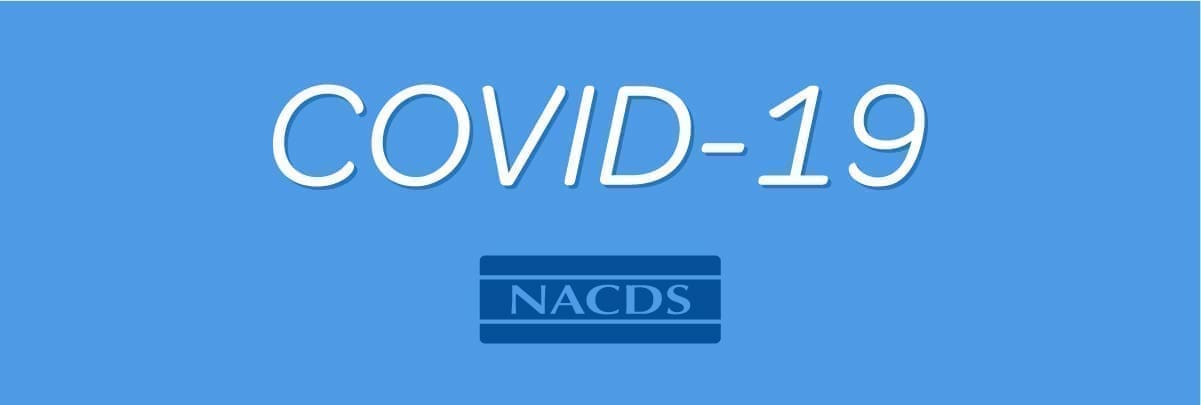
To NACDS Chain Members:
Based on extensive member input, NACDS today submitted a letter to the Biden Administration with recommendations that would help ensure the eligible public can efficiently and effectively access COVID vaccine boosters at local pharmacies – should boosters be recommended by the Advisory Committee on Immunization Practices (ACIP), the Centers for Disease Control and Prevention (CDC) and the Food and Drug Administration (FDA).
NACDS sent the letter to Health and Human Services (HHS) Secretary Xavier Becerra; Centers for Medicare & Medicaid Services (CMS) Administrator Chiquita Brooks-LaSure; CDC Director Rochelle Walensky, MD, MPH; FDA Acting Commissioner Janet Woodcock; White House Senior Policy Advisor Sonya Sackner-Bernstein; ACIP Chair Grace Lee, MD, MPH; and other senior Administration officials.
NACDS also commended the Biden Administration for their ongoing leadership in the COVID response, and for their planning efforts to help ensure systems and operations are prepped and equipped in advance of COVID boosters being operationalized.
In releasing the letter, NACDS President and CEO Steven C. Anderson said:
“We thank the Biden Administration for their collaborative approach and partnership throughout the ongoing vaccination effort, and we appreciate the opportunity to provide critical recommendations and comments that come directly from NACDS member pharmacies’ front-line experience in the COVID vaccination campaign.
“NACDS’ recommendations for COVID vaccine booster doses prioritize the patient. We are urging the Biden Administration to ensure clarity around which individuals are recommended to receive a COVID booster dose; to take action to instill public confidence in receiving COVID vaccines and other vaccines at the same time; to swiftly address ongoing COVID vaccination reimbursement challenges; and to proactively address barriers to an efficient pandemic response effort in 2022.
“We’ve always said pharmacies would be the sustainable vaccination solution. True to form, pharmacies continue to meet the nation’s preventive care vaccination needs, all in one visit, and stand ready to provide vital access to COVID-19 vaccine boosters when authorized and recommended to do so.”
NACDS recommended the following in today’s letter to the Administration – to maximize the success of any COVID vaccine booster program and to leverage convenient access to COVID vaccine boosters at pharmacies:
- “ACIP and CDC should outline an explicit age (e.g., 18 years and older) and time interval (e.g., no sooner than 8 months from date of the second dose) in any forthcoming booster recommendation, without flexibility that could lead to public doubt and confusion regarding if someone may indeed benefit from a booster dose.” [Note: the 8-month interval was used as an example based on initial information, and subsequently a 6-month interval has entered into discussions.]
- Any upcoming recommendation determined by “ACIP and CDC should explicitly support that individuals may self-attest to their primary vaccination series without requiring verification or proof.”
- ACIP and CDC should “recognize the need for acceptable substitutions for booster doses, for example, when it is not feasible to match the primary vaccine series product” and “should provide guidance for vaccine providers when the primary series information cannot be confirmed by the patient.”
- ACIP and CDC should “issue clear guidance regarding booster recommendations for patients who received non-mRNA COVID-19 vaccines, including the Janssen product and the AstraZeneca product.”
- “CDC should express that jurisdictional awardee agreements, data use agreements, funding awards, et al., require jurisdictions to abide by ACIP/CDC’s recommended eligibility criteria for boosters and CDC’s federal reporting requirements.”
- ACIP and CDC should “develop and widely publish a strong recommendation on the co-administration of COVID vaccines and other vaccines” to help alleviate patient concerns and hesitancies – particularly “as the confluence of flu season and the roll out of COVID-19 boosters appears imminent.”
- CMS should swiftly address ongoing COVID-19 vaccination reimbursement challenges and “make the necessary updates and provide guidance to all payers regarding booster doses for the general population as soon as possible via its COVID-19 Provider Toolkit.”
- HHS should “take swift action to amend the current Public Readiness and Emergency Preparedness (PREP) Act declaration to include an extension for authorities granted to pharmacy personnel beyond the declared Public Health Emergency until at least October 2024.” This critical move would allow “pharmacists to order and administer – and pharmacy technicians and interns to administer – COVID-19 vaccines, COVID-19 tests, and all ACIP-recommended vaccines to individuals 3 years and older; in addition to technicians and interns administering flu shots to adults.”
NACDS’ letter is the latest in the ongoing and collaborative effort to match important government actions with pharmacies’ front-line insights and experiences throughout the COVID response.
In early August, the Biden Administration expanded American adults’ access to seasonal flu vaccinations by extending authorities under the PREP Act to include pharmacy technicians’ and pharmacy interns’ ability to provide adult flu vaccinations.
This PREP Act declaration, for which NACDS advocated, filled a void by empowering pharmacy team members to provide influenza vaccinations for adults just as they already are allowed to provide them for those 18 and under by virtue of prior PREP Act declarations.
Since the very beginning, NACDS has worked closely with the federal and state governments on the COVID response and pharmacies’ critical role in it, communicating what is needed from operations to public messaging and more.
Most recently, NACDS made operational recommendations to the federal government in advance of the FDA’s authorization of additional doses of COVID shots for immunocompromised individuals – to help facilitate public understanding and access to the vaccines.